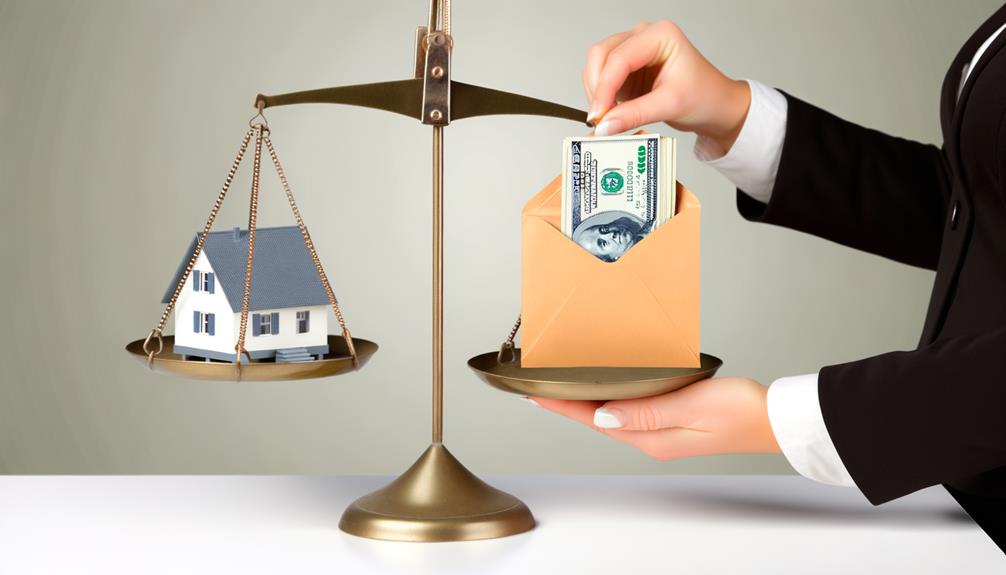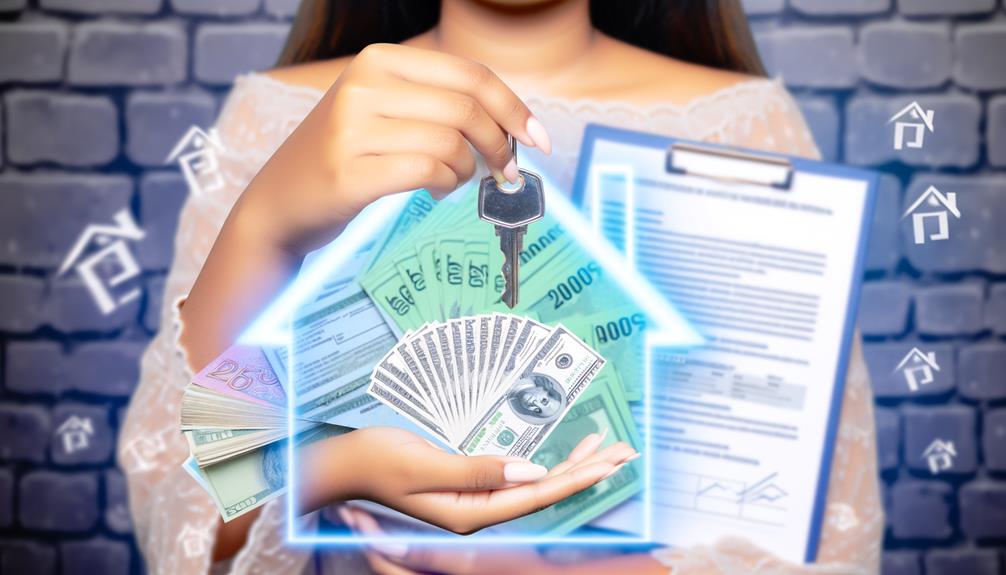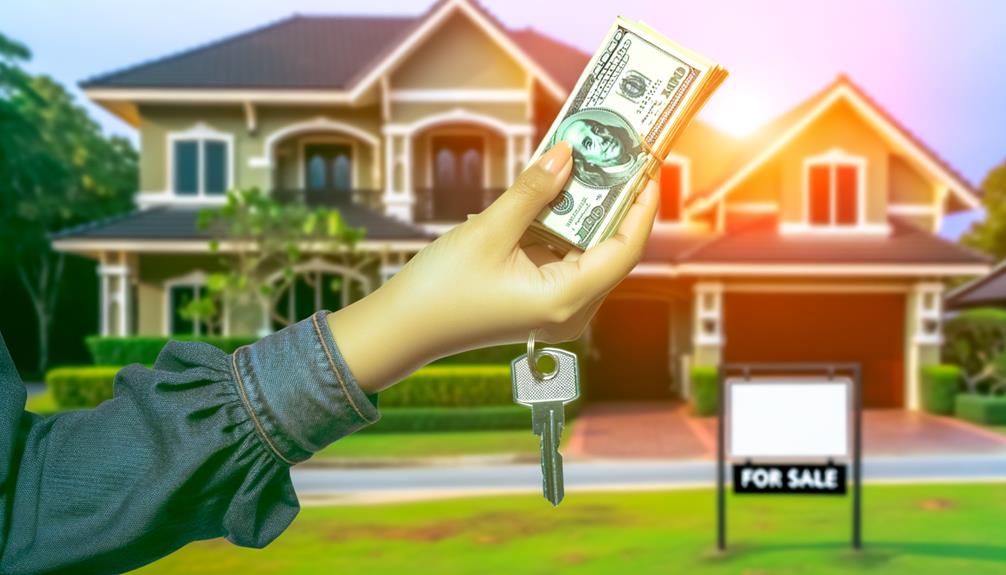Just as you're considering the prospect of purchasing a house outright, a surprising number of people are exploring the same path. You're not alone in wanting to bypass the lengthy and often complicated mortgage process. Buying a house for cash can simplify the process, eliminate interest costs and give you a stronger bargaining position.
But how exactly do you navigate this significant transaction and what should you anticipate along the way? Well, let's unravel this complex journey you're about to embark on, one step at a time.
Key Takeaways
- Assess your available cash and financial resources before buying a house for cash. Consider savings, investments, and retirement accounts to determine the right amount of cash needed.
- Research and prioritize your long-term housing needs and preferences. Utilize online resources or seek assistance from a real estate agent to find suitable properties.
- Understand the importance of negotiating strategically when buying a house for cash. Analyze market trends, assess property conditions, and highlight the ability to buy with cash to leverage negotiation power.
- Prepare for the closing process by ensuring funds are readily available for immediate transfer. Work closely with a real estate agent to complete necessary legal documents and arrange for payment via cashier's check or wire transfer.
Gathering Your Cash
Before plunging into the process of buying a house for cash, it's crucial to meticulously evaluate your available sources of cash, such as savings, investments, or retirement accounts. You might fancy becoming a 'cash buyer', but do you have enough cash? It's not just about having a large sum of cash; it's about having the right amount to buy a house with cash.
Consider this: a house purchase in cash can impact your long-term financial goals. It's not a decision to take lightly. You need to balance the allure of owning a cash home with your other financial needs.
Proof of Funds
Once you've accumulated the necessary funds, it's vital to provide a 'proof of funds' document, which confirms your financial ability to make a cash purchase. This proof is especially crucial when you're ready to buy a home with cash. Sellers and real estate agents require this assurance before they consider your cash offer.
To provide proof of funds when buying a home, follow these steps:
- Contact your bank for an official bank statement. This should clearly show your bank account balance.
- Request a 'proof of funds' letter from your bank. Ensure it has an official bank header and signature.
- Keep recent transaction records handy. These are often necessary to further validate your financial status.
- Maintain your funds in a liquid state. Accessibility is key when making cash offers.
House Hunting

When hunting for a house to buy with cash, it's crucial to identify the ideal properties fitting your needs and lifestyle.
It's equally important to set a realistic budget based on your financial resources.
Identifying Ideal Properties
To identify your ideal property for a cash purchase, first determine your budget and preferred location, which will effectively narrow down your house hunting options. This is a crucial step in the process as it frames your financial capacity to pay for a home without taking out a mortgage.
- Identify your long-term housing needs. Do you need a large family home, or will a cozy townhouse suffice?
- Use the expansive resources available online or enlist the help of a real estate agent to scout the real estate market.
- Prioritize house viewings and inspections. Here, you'll evaluate the house's condition and features.
- Finally, consider the estate's neighborhood and its proximity to essential services.
Setting a Budget
After identifying your ideal property, it's crucial you establish a solid budget, taking into account not just the purchase price but also the ongoing costs of home ownership. When buying a new home, it's not just about having cash without finance, it's about understanding your personal finance and setting a realistic budget based on your financial situation.
Your real estate agent can offer advice, but ultimately, you need to set a budget that provides a competitive advantage without straining your finances. Your budget shouldn't only cover the purchase price, but also unexpected expenses and regular costs like property taxes and maintenance.
Negotiating the Price
Diving into the house hunting process, you'll find that negotiating the price is a crucial step. Understanding the local market, considering the property's current condition, and making a compelling case for your offer can all contribute to a successful negotiation. Here's how to approach it:
- Understand the Local Market: Analyze recent comparable sales to gauge a fair price.
- Assess the Property Condition: Reflect necessary repairs in your all-cash offer.
- Present your Case: Highlight your ability to buy with cash, eliminating closing costs and speeding up the homebuying process.
- Negotiate Strategically: Make a competitive offer that leaves room for counteroffers.
Your bottom line benefits when you're savvy in understanding homeowners association fees and potential home equity loans, contributing to a smoother process.
Bidding Strategy

When it comes to crafting a compelling offer, it's not just about the price you're willing to pay, but also about the terms and conditions that might appeal to the seller. You're not just buying a house; you're asking someone to choose you to take ownership of their current home. Paying cash can certainly make your offer more attractive, but it's not the only factor.
Consider the earnest money deposit, a good faith gesture that demonstrates your serious intent to purchase the home. This is a crucial part of your offer that can set you apart in bidding wars. You can also appeal to the seller by offering a flexible closing timeline, or even offering to cover certain closing costs.
Ensure you have a trusted settlement agent to handle the legalities and paperwork. A competent agent can help make your offer smooth and appealing to the seller. Be prepared to make a strong offer; paying cash doesn't always mean you'll get a discount. Remember, the goal is to make the seller feel confident in your ability to buy their home quickly and without hassle.
Closing the Deal
When it's time to close the deal on your cash home purchase, you'll need to focus on two key areas:
- Finalizing the payment process: You'll want to ensure your funds are in order, ready for immediate transfer upon agreement.
- Navigating the legal documentation procedures: Simultaneously, you'll be working closely with your real estate agent to prepare, understand, and sign all necessary legal documents to seal the deal.
Finalizing Payment Process
To finalize the payment process and close the deal on your cash house purchase, you'll first need to gather and provide proof of funds from your bank to reassure the seller of your financial readiness.
- Validate the amount of cash in your savings account to ensure you have enough to pay for a house.
- Arrange to bring a cashier's check or wire transfer on closing day.
- Verify the condition of the house with a final walk-through.
- Seal the deal by making an all-cash payment and receiving the property deed.
This process of buying a House With Cold, Hard Cash shows you don't just belong, you're in control. Finalizing the payment process in this way also means you'll need the cash ready on your end to ensure a smooth transaction.
Legal Documentation Procedures
Once your all-cash payment is ready, it's crucial to understand the legal documentation procedures involved in closing the deal on your new home. As buyers, you're expected to conduct due diligence. This means ensuring you're able to qualify for title insurance, which protects you from previous legal discrepancies tied to the property.
The Profile of Home Buyers reports that during closing, it's essential to factor in property taxes and homeowners insurance. This way, you're not caught off guard with unexpected expenses.
Before finalizing, conduct a final walk-through. This is your last chance to ensure the property's condition is as you agreed. This step is part of your due diligence, so don't skip it. Remember, closing the deal means you're accepting the property as-is.
Post-Purchase Considerations

After closing the deal on your cash home purchase, it's crucial to shift your focus to the post-purchase considerations. These considerations include managing ongoing expenses, tapping into home equity, estate planning, making necessary financial adjustments, and understanding homeownership responsibilities.
- Managing ongoing expenses: Although you won't have mortgage payments to worry about, you'll need to account for property taxes, homeowners insurance, utilities, and maintenance costs. Smart financial planning helps ensure your peace of mind.
- Tapping into home equity: This can be a beneficial way to fund renovations or consolidate debt. However, be mindful of the tax implications. A financial advisor can provide expert advice here.
- Estate planning: Proper planning helps you establish beneficiaries and plan for the future transfer of the property. This is an essential step towards achieving your financial goals.
- Understanding homeownership responsibilities: Now that you're a homeowner, familiarize yourself with local regulations and ongoing duties. It's all part of belonging to a community.
Frequently Asked Questions
Is It a Good Idea to Buy a House With Cash?
Yes, it's a great idea if you value ownership security, financial freedom, and market influence. Cash purchases offer numerous advantages but consider your investment strategy, risk evaluation, and the impact on savings and real estate liquidity.
Does the IRS Know When You Buy a House Cash?
Yes, the IRS may know when you buy a house with cash. Large cash payments can trigger audits, and real estate purchases require recording. Your financial privacy isn't absolute in cash transactions due to reporting rules.
How Much Less Can You Offer on a House With Cash?
You can often offer 5-10% less when buying a house with cash. This reflects the financial advantages to the seller—no mortgage complications, faster closing. However, market conditions and seller motivations can influence the discount.
How to Negotiate Buying a House With Cash?
To negotiate buying a house with cash, leverage your cash buyer's power. Research the market, assess risks, inspect the home, consider legalities, and account for hidden costs. Use these insights to drive your negotiation tactics.
Conclusion
So, you've navigated the thrilling world of cash home buying. Funny, isn't it? Who'd think gathering stacks of greenbacks could lead to such a rollercoaster ride. But hey, now you're not just a homeowner, but a cash homeowner.
No pesky mortgage ties for you. Just remember, this isn't the end. Stay astute, consult with professionals, and keep your house in top shape.
Here's to your new adventure in home ownership.


